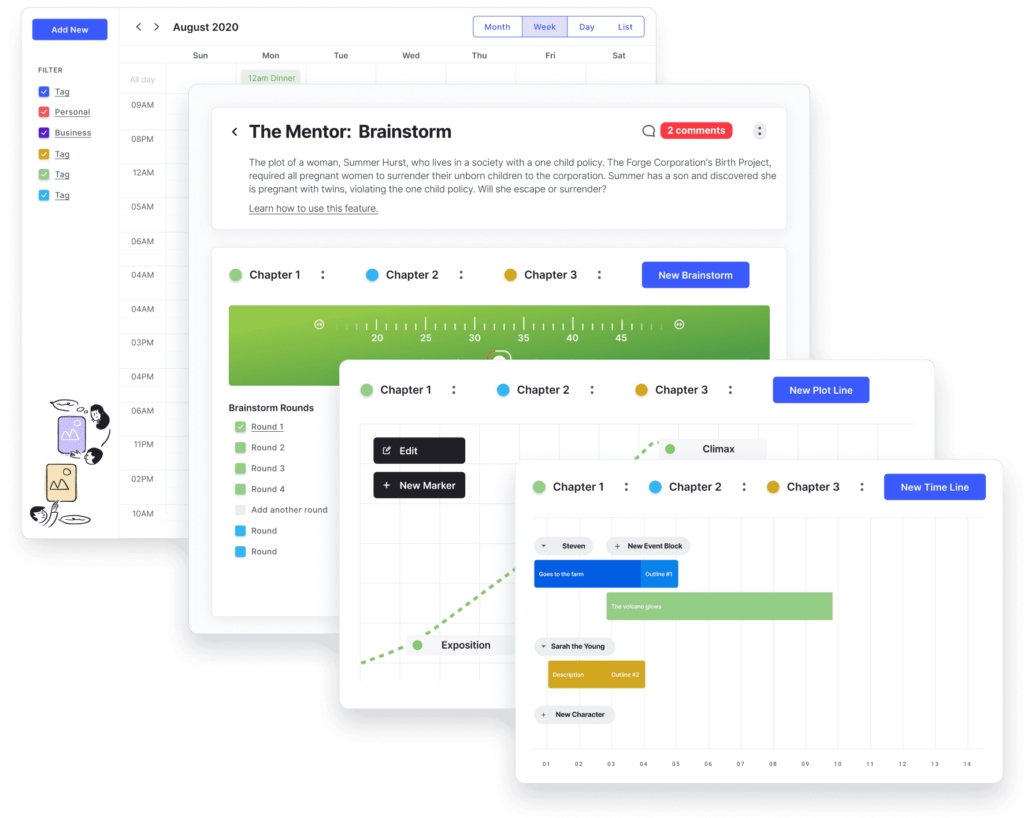Break Down Your Writing Process into Manageable Goals
Writing a novel is an ambitious undertaking, but the path to success is paved with clear, manageable goals. In Step 2 of our journey, we explore the significance of setting clear goals and breaking down the writing process into manageable steps. By doing so, you’ll not only stay on track but also find motivation, focus, and a sense of accomplishment along the way.
The Power of Goal Setting
Goal setting is a fundamental aspect of any creative endeavor, including writing a novel. It provides structure to your work and helps you navigate the vast sea of possibilities that a novel presents. Here’s why goal setting is essential for writers:
Motivation: Goals give you something to strive for. They provide a sense of purpose and motivation to keep writing, especially during challenging or uninspired moments.
Focus: Clear goals help you prioritize your writing tasks. When you know what you need to accomplish, you’re less likely to get distracted or overwhelmed by the enormity of the writing process.
Measurable Progress: Goals allow you to measure your progress. As you achieve each goal, you gain a sense of accomplishment that propels you forward.
Accountability: When you set specific goals, you hold yourself accountable for meeting them. This self-accountability is crucial for maintaining consistency in your writing practice.
Breaking Down the Writing Process
Now that we understand the importance of setting goals, let’s explore how to break down the novel-writing process into manageable steps:
1. Define Your Ultimate Goal:
Begin by clarifying your ultimate goal. What do you want to achieve with your novel? Is it to complete a first draft, secure a publishing deal, or simply share your story with a small audience? Your ultimate goal will guide the rest of your goal-setting process.
2. Create a Timeline:
Determine a realistic timeline for your writing project. Consider factors like your daily or weekly writing routine, personal commitments, and the complexity of your novel. A timeline helps you set milestones and deadlines for achieving specific goals.
3. Set Long-Term Goals:
Long-term goals are the major milestones in your novel-writing journey. They could include completing the first draft, revising your manuscript, or submitting your work to agents or publishers. Long-term goals should align with your ultimate goal and your timeline.
4. Break Long-Term Goals into Short-Term Goals:
Once you’ve identified your long-term goals, break them down into smaller, manageable short-term goals. For example, if your long-term goal is to complete a 100,000-word novel in a year, your short-term goals might include writing a certain number of words or chapters each week or month.
5. Make Goals Specific, Measurable, Achievable, Relevant, and Time-Bound (SMART):
SMART goals are specific, measurable, achievable, relevant, and time-bound. By applying this framework to your writing goals, you ensure they are well-defined and actionable. For example, instead of setting a vague goal like “write more,” a SMART goal would be “write 1,000 words every day for the next month.”
6. Prioritize Goals:
Not all goals are created equal. Some may be more critical to your project’s success than others. Prioritize your goals based on their importance and their alignment with your overall vision for your novel.
7. Set Both Process and Outcome Goals:
Process goals focus on the steps you’ll take to achieve an outcome, while outcome goals define the desired result. It’s essential to have a balance of both. For instance, a process goal might be “write for two hours daily,” while an outcome goal could be “finish the first draft within six months.”
8. Create a Visual Representation:
Consider creating a visual representation of your goals, such as a timeline, calendar, or project board. Visual aids serve as constant reminders of what you’re working toward and help you stay organized.
9. Review and Adjust Goals Regularly:
As you progress through your novel-writing journey, periodically review and adjust your goals. Circumstances may change, and you may discover new insights that require modifications to your plan.
10. Celebrate Achievements:
Don’t forget to celebrate your achievements, no matter how small. Recognizing your progress boosts your confidence and motivation, reinforcing your commitment to your writing goals.
Examples of Writing Goals
Now, let’s explore some specific writing goals you might consider as you break down your novel-writing process:
Word Count Goals: Set daily or weekly word count targets. For example, aim to write 1,000 words every day.
Chapter Goals: Establish goals for completing specific chapters or sections of your novel. This helps you maintain a sense of structure in your storytelling.
Revision Goals: If you’re in the revision phase, set goals for the number of pages or chapters you’ll revise each day or week.
Submission Goals: If you’re aiming to get published, set goals for submitting your manuscript to agents or publishers within a certain timeframe.
Research Goals: If your novel requires research, set goals for conducting research, gathering information, and integrating it into your story.
Character or Plot Development Goals: Break down character development or plot advancement into achievable steps. For example, create goals for fleshing out a character’s backstory or resolving a key plot point.
Conclusion: Your Journey, Your Goals
Breaking down your writing process into manageable goals is a powerful strategy for making your novel-writing journey less daunting and more achievable. Remember that your goals should align with your ultimate vision for your novel, and they should be adaptable to changes in your circumstances and creative insights. With each goal you achieve, you move one step closer to bringing your novel to life and sharing your story with the world.
Unlock your storytelling potential with Charlii! Whether you’re an aspiring author or a seasoned writer, Charlii is your ultimate creative companion.
Download now and start crafting captivating stories today. Your creativity awaits!




